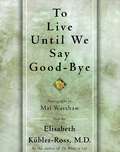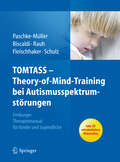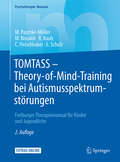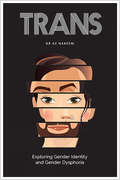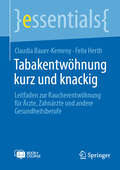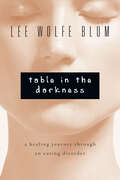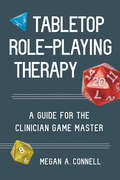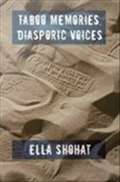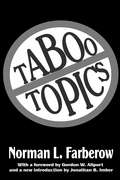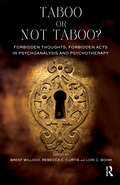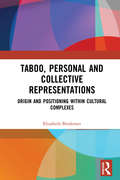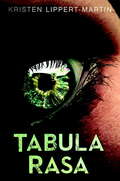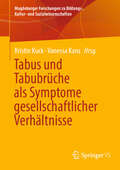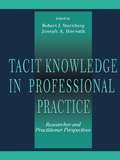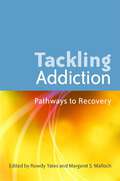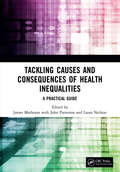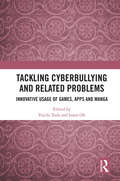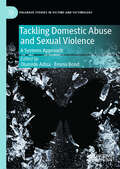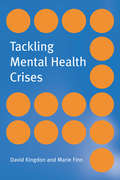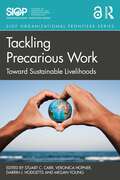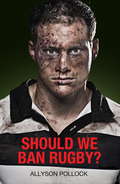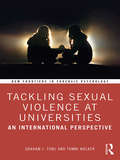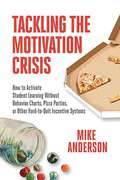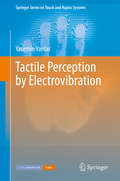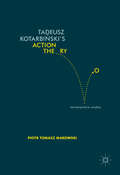- Table View
- List View
TO LIVE UNTIL WE SAY GOOD BYE
by Elisabeth Kübler-RossThis exploration of counseling work with terminal patients visually outlines how Dr. Kübler-Ross, world-renowned psychiatrist and authority on death, helps her patients come to terms with death.Dr. Elisabeth Kübler-Ross, whose books on death and dying have sold in the millions, now offers an extraordinary visual record of her work. Through the brilliant photographs of Mal Warshaw, To Live Until We Say Good-Bye gives a gripping, intimate view of Dr. Kübler-Ross's counseling work with terminally ill patients as she brings them to an acceptance of death.
TOMTASS - Theory-of-Mind-Training bei Autismusspektrumstörungen
by Eberhard Schulz Mirjam S. Paschke-Müller Reinhold Rauh Monica Biscaldi Christian FleischhakerDas Therapieprogramm zur Behandlung von Kindern und Jugendlichen mit Autismus gliedert sich in einen theoretischen und einen praktischen Teil. Im Theorieteil werden die Grundlagen des Autismus kurz, präzise und klar verständlich beschrieben. Der Praxisteil, das eigentliche Therapiemanual, besteht aus einheitlich aufgebauten Therapieeinheiten (Modulen), die für die Gruppentherapie mit autistischen Kindern und Jugendlichen eingesetzt werden können. Das Manual enthält klare Handlungsanweisungen und zahlreiche Arbeitsmaterialien.
TOMTASS - Theory-of-Mind-Training bei Autismusspektrumstörungen: Freiburger Therapiemanual für Kinder und Jugendliche (Psychotherapie: Manuale)
by Eberhard Schulz Mirjam S. Paschke-Müller Reinhold Rauh Monica Biscaldi Christian FleischhakerDas Therapieprogramm zur Behandlung von Kindern und Jugendlichen mit Autismus gliedert sich in einen theoretischen und einen praktischen Teil. Im Theorieteil werden die Grundlagen des Autismus kurz, präzise und klar verständlich beschrieben. Der Praxisteil, das eigentliche Therapiemanual, besteht aus einheitlich aufgebauten Therapieeinheiten (Modulen), die für die Gruppentherapie mit autistischen Kindern und Jugendlichen eingesetzt werden können. Das Manual enthält klare Handlungsanweisungen und zahlreiche Arbeitsmaterialien.
TRANS: Exploring Gender Identity and Gender Dysphoria
by Kevan Wylie Az Hakeem Fintan B Harte Andrew Ives Rosemary Anne Jones Elizabeth Riley Melissa Vick Luka GriffinWhat is gender dysphoria? How does it affect people? What do terms like intersex, cisgender, and transsexualism mean? This book, the first of its kind, presents an easy-to-read, jargon-free guide to help anyone understand the terminology and the day-to-day reality of gender dysphoria and related concepts.TRANS is a book for everyone – insightful enough for professionals, but accessible enough for all. Put simply, TRANS explains what gender dysphoria is, how it affects people, and what is available, medically and psychotherapeutically, to support people with gender dysphoria.The editor, Dr Az Hakeem, has assembled a group of contributors to give readers a truly accessible guide to the psychology and the everyday reality of gender dysphoria, transvestism, gender reassignment, and being trans. The book even addresses ‘the difficult questions’ like ‘What do we tell the children?’ and ‘What happens when you change your sex, then change your mind?’
Tabakentwöhnung kurz und knackig: Leitfaden zur Raucherentwöhnung für Ärzte, Zahnärzte und andere Gesundheitsberufe (essentials)
by Felix Herth Claudia Bauer-KemenyDieses Essential plus course möchte allen im Gesundheitswesen tätigen Personen aufzeigen, wie Sie schnell und einfach, aber dennoch effektiv Tabakentwöhnung im Klinik- oder Praxisalltag durchführen können. In Verbindung mit dem dazugehörigen Online-Kurs lernen Sie die Methoden der Kurzintervention kennen, werden über die zur Tabakentwöhnung zugelassenen Medikamente informiert und erfahren, wo und wie entwöhnungswillige Rauchende weitere Unterstützungsangebote erhalten, damit ein Rauchstopp auch wirklich gelingen kann. Den kostenlosen Zugang zum Online-Kurs finden Sie direkt im Buch.
Table in the Darkness: A Healing Journey Through an Eating Disorder
by Lee Wolfe Blum2014 Readers' Choice Awards Honorable Mentionnot
Tabletop Role-Playing Therapy: A Guide for the Clinician Game Master
by Megan A. ConnellA comprehensive book explaining “applied RPGs”—using role-playing games therapeutically. Across the globe, therapists are using tabletop roleplaying games (RPG) such as Dungeons & Dragons as a part of their practice. This book provides an overview of what RPGs are and what makes them such an effective and powerful tool for therapy. By examining research on gaming, flow, immersion, and role-play, readers will gain a better understanding of the theoretical underpinnings and how to skillfully and ethically use RPGs in their own practices. The author also looks at the history of RPGs, specifically focusing on issues of diversity and representation to help providers understand some possible pitfalls that exist within the medium. The book utilizes an example group to walk through everything from conception, planning, running, documentation, and termination of the group.
Taboo Memories, Diasporic Voices
by Ella ShohatTaboo Memories, Diasporic Voices brings together for the first time a selection of trailblazing essays by Ella Shohat, an internationally renowned theorist of postcolonial and cultural studies of Iraqi-Jewish background. Written over the past two decades, these twelve essays--some classic, some less known, some new--trace a powerful intellectual trajectory as Shohat rigorously teases out the consequences of a deep critique of Eurocentric epistemology, whether to rethink feminism through race, nationalism through ethnicity, or colonialism through sexuality. Shohat's critical method boldly transcends disciplinary and geographical boundaries. She explores such issues as the relations between ethnic studies and area studies, the paradoxical repercussions for audio-visual media of the "graven images" taboo, the allegorization of race through the refiguring of Cleopatra, the allure of imperial popular culture, and the gender politics of medical technologies. She also examines the resistant poetics of exile and displacement; the staging of historical memory through the commemorations of the two 1492s, the anomalies of the "national" in Zionist discourse, the implications of the hyphen in the concept "Arab-Jew," and the translation of the debates on orientalism and postcolonialism across geographies. Taboo Memories, Diasporic Voices not only illuminates many of the concerns that have animated the study of cultural politics over the past two decades; it also points toward new scholarly possibilities.
Taboo Topics: The Atherton Press Behavioral Science Series
by Norman L. FarberowWhy is it so hard to investigate taboo topics? A myriad of forces shape and fashion human action, reaction, thought, and feeling, and these are not always well understood. Norman L. Farberow argues that culture itself provides structure for its members, developing in a well-defined way the rules to which they will conform. Such rules find expression not only in written laws and regulations but include, and most often stem from, unwritten folkways, customs, and especially taboos, the subject of this book.The researchers reporting in this volume take no position on the nature of a taboo itself, but concentrate on the difficulty in investigating taboos. As members of society and human beings, they do make judgments and personal investments. Thus, when taboos continue or develop without useful society-enriching functions or facilitate self-destructive activities, they raise questions about why they persist.Such topics include many areas‘some social, such as sex, death, and peace; others more academic, such as parapsychology, graphology, religion, and hypnosis. Peace and the public are included in the discussion because they are emotion-laden areas and powerful and important factors in a shrinking world and expanding universe. Peace, especially, has begun to be looked upon with suspicion perhaps a real commentary on our times. This probing collection will be sure to interest sociologists, anthropologists, and all other social scientists.
Taboo or Not Taboo? Forbidden Thoughts, Forbidden Acts in Psychoanalysis and Psychotherapy: Forbidden Thoughts, Forbidden Acts in Psychoanalysis and Psychotherapy (The\developments In Psychoanalysis Ser.)
by Lori C. Bohm'Psychoanalysis has, from its inception, been a discipline concerned with overcoming the ill effects of certain social taboos. Given this focus, it might be assumed that psychoanalysis and its practitioners are free of the constraints imposed by restrictive taboos. This book challenges this idea by examining a sampling of the taboos that are rife in the field. It is not intended to offer a complete summary of all of the forbidden ideas, clinical procedures, behaviors and institutional practices in psychoanalysis, but rather to raise consciousness about the fact that even within a field which encourages freedom of expression, many issues remain difficult to fully discuss both in the consulting room and in professional discourse. The book provides a refreshing, thoughtful, honest look at many of the taboos present in psychoanalysis, even at this moment of greatly improved communication between the various theoretical schools in the field. Reading it provides a sense of freedom for the reader, as speaking of forbidden thoughts always does.
Taboo, Personal and Collective Representations: Origin and Positioning within Cultural Complexes
by Elizabeth BrodersenTaboo, Personal and Collective Representations examines the symbolic nature of taboo, asking what is the purpose of a taboo and how does it vary cross-culturally? The book focuses on the concept of taboo as an in-between, organizing principle which separates and differentiates stages through a ritual process of separation of order as clean/blessed from disorder as polluted/disassociated. This book uses an interdisciplinary approach which compares the anthropological, ethnological, sociological, and depth psychological perspectives of renowned scholars in their examination of taboos. Unconscious/conscious taboos influence how we perceive transitional, indeterminate states across margins in the maturation and individuation processes. The book argues that a taboo embodies the perilous, symbolic meaning of such a rite of passage and that its emotional value and intensity in the form of symptomology varies across cultures. Taboo, Personal and Collective Representations will be of great interest to researchers, academics and post-graduate students in the fields of anthropology, ethnology, origins of religion, race, gender, and depth psychology.
Tabula Rasa
by Kristen Lippert-MartinThe Bourne Identity meets Divergent in this action-packed debut thriller with a Katniss-esque heroine fighting to regain her memories and stay alive, set against a dystopian hospital background.Sarah starts a crazy battle for her life within the walls of her hospital-turned-prison when a procedure to eliminate her memory goes awry and she starts to remember snatches of her past. Was she an urban terrorist or vigilante? Has the procedure been her salvation or her destruction?The answers lie trapped within her mind. To access them, she'll need the help of the teen computer hacker who's trying to bring the hospital down for his own reasons, and a pill that's blocked by an army of mercenary soldiers poised to eliminate her for good. If only she knew why . . ."This is a snap-the-whip story, dark and fast. The sparks of humor in the voice won me over. Bottom line: I think the cocktail of suspense and believable smart-assery adds up to an addictive dose of reader appeal." --Blythe Woolston, author of the William C. Morris Award winner The Freak Observer
Tabus und Tabubrüche als Symptome gesellschaftlicher Verhältnisse (Magdeburger Forschungen zu Bildungs-, Kultur- und Sozialwissenschaften)
by Kristin Kuck Vanessa KanzDer Sammelband behandelt aus den Perspektiven der Kultur- und Gesellschaftswissenschaften das Phänomen Tabu und seine vielseitigen Ausprägungen schwerpunktmäßig in der zeitgenössischen europäischen Gesellschaft. Zwar entstammt das Konzept selbst den polynesischen Gesellschaften, die durch Seefahrer im 18. Jahrhundert entdeckt wurden, aber durch Missionsbewegungen in der Ferne, Romantisierungen in der Heimat und die europäische Aufklärung entwickelte sich ein ganz eigenes Tabukonzept in Europa, das bis heute starke sozial ordnende Effekte hat. Tabus legen fest, was von Mitgliedern einer Gruppe an Gedanken, Handlungen, Gefühlen und Themen zugelassen wird und was nicht, und gleichzeitig sind Tabubehauptungen und Tabubrüche auch Thematisierungsstrategien. Der Band folgt daher der These, dass Tabugrenzen nicht nur stetig ausgehandelt werden, sondern auch als soziale Konstrukte gesellschaftliche Verhältnisse wiederspiegeln. Enttabuisierungsbestrebungen, beispielsweise in Bezug auf psychische Krankheiten oder auf die Kommunikation von Gewalterfahrungen werden heutzutage oft mit Hochwertkonzepten wie Selbstbestimmung, Diversität und Gleichberechtigung legitimiert. Gleichzeitig verschärfen sich auch Tabugrenzen, wenn es z. B. um die Stigmatisierung von Diskriminierung geht. Veränderungen in den Tabugrenzen sind also nicht zufällig, sondern Ausdruck von gesellschaftlichen Verhältnissen und Entwicklungen. Die Beiträge werfen aus den verschiedenen Perspektiven verschiedener kultur- und gesellschaftswissenschaftlicher Fächer Schlaglichter auf Forschungen, die mit Tabus umgehen und umgehen müssen. Sie geben so einen Einblick in aktuelle Aushandlungen zwischen dem Tabuisierten und dem Nicht-(Mehr)-Tabuisierten.
Tacit Knowledge in Professional Practice: Researcher and Practitioner Perspectives
by Robert J. Sternberg Joseph A. HorvathThose responsible for professional development in public and private-sector organizations have long had to deal with an uncomfortable reality. Billions of dollars are spent on formal education and training directed toward the development of job incumbents, yet the recipients of this training spend all but a fraction of their working life outside the training room--in meetings, on the shop floor, on the road, or in their offices. Faced with the need to promote "continuous learning" in a cost-effective manner, trainers, consultants, and educators have sought to develop ways to enrich the instructional and developmental potential of job assignments--to understand and facilitate the "lessons of experience." Not surprisingly, social and behavioral scientists have weighed in on the subject of on-the-job learning, and one message of their research is quite clear. This message is that much of the knowledge people use to succeed on the job is acquired implicitly--without intention to learn or awareness of having learned. The common language of the workplace reflects an awareness of this fact as people speak of learning "by doing" or "by osmosis" and of professional "instinct" or "intuition." Psychologists, more careful if not clearer in their choice of words, refer to learning without intention or awareness as "implicit learning" and refer to the knowledge that results from this learning as "tacit knowledge." Tacit Knowledge in Professional Practice explores implicit learning and tacit knowledge as they manifest themselves in the practice of six knowledge-intensive professions, and considers the implications of a tacit-knowledge approach for increasing the instructional and developmental impact of work experiences. This volume brings together distinguished practitioners and researchers in each of the six disciplines to discuss their own research and/or professional experience and to engage each other's views. It addresses professional practice in its totality -- from the technical to the interpersonal to the crassly commercial -- not simply a few aspects of practice that lend themselves to controlled study. Finally, this edited volume seeks to go beyond the enumeration of critical experiences to an understanding of the psychological mechanisms that underlie learning from experience in professional disciplines and, in so doing, to lay a foundation for innovations in professional education and training.
Tackling Addiction
by Rowdy Yates Margaret S. MallochThe issue of 'recovery' has been increasingly prioritised by policymakers in recent years, but the meaning of the concept remains ambiguous. This edited collection brings together the thoughts and experiences of researchers, practitioners and service users from the fields of health, addiction and criminal justice and centres on current developments in addiction policy and practice. Tackling Addiction examines what recovery, addiction and dependence really mean, not only to the professional involved in rehabilitation but also to each individual client, and how 'coerced treatment' fails to take account of recovery as a long-term and ongoing process. Chapters cover the influence of crime and public health in UK drug policy; the ongoing emphasis on substitute prescribing; the role of recovery groups and communities; and gendered differences in the recovery process and implications for responses aimed at supporting women. Tackling Addiction will be essential reading for practitioners, researchers, policy makers and students in the fields of addiction, social care, psychology and criminal justice.
Tackling Causes and Consequences of Health Inequalities: A Practical Guide
by James Matheson John Patterson Laura NeilsonAddressing health inequalities is a key focus for health and social care organizations, yet this is the first book to explore how best frontline health workers in areas of deprivation can address these problems. Aimed at doctors and their wider multidisciplinary teams, this book provides key knowledge and practical advice on how to address the causes and consequences of health inequalities to achieve better outcomes for patients. Considering the psychological, financial and social aspects of well-being as well as health concerns, this book offers a concise but comprehensive overview of the key issues in health inequalities and, most importantly, how practically to address them. Key Features Comprehensively covers the breadth of subjects identified by RCGP’s work to formulate a curriculum for health inequalities The first book to address the urgent area of causes and consequences of health inequalities in clinical practice. Chapters are authored by expert practitioners with proven experience in each aspect of health care. Applied, practical focus, demonstrating approaches that will work and can be applied in ‘every’ situation of inequality. Provides evidence of how community based primary care can make a change.
Tackling Cyberbullying and Related Problems: Innovative Usage of Games, Apps and Manga
by Toda, Yuichi / Oh, InsooThis book looks at innovative tools developed by Japanese and Korean researchers and practitioners to tackle cyberbullying and internet-related problems (addiction, cybercrimes, etc.). The contributors have created preventative and intervention measures for children using games, apps, manga and anime videos, which are more accessible for children than textbooks or classroom-based lessons. The contributors cover their experiences of developing these new approaches with children, parents and teachers as well as giving insights and evidence into how these innovative techniques and methods work. By sharing their expertise, the authors hope to contribute to further improvements of games, apps, manga and anime and to improve the safety of children online.
Tackling Domestic Abuse and Sexual Violence: A Systems Approach (Palgrave Studies in Victims and Victimology)
by Emma Bond Olumide AdisaThis edited book brings together a range of expert voices – academics, researchers, practitioners, activists, and policy leads – who are responding to domestic and sexual violence (DASV) in various settings. The chapters are united in the need to embed systemic responses to these social issues within a broader accountability and support system. It provides a timely and refreshing take on tackling a pervasive social issue at a time of increased complexity and crisis while exploring the real-world consequences and impacts of service provision at a systems level, emphasising the need for greater coordination and alignment.
Tackling Mental Health Crises
by David Kingdon Marie FinnTackling Mental Health Crises provides a practical guide to combining social and psychological responses to mental health problems. David Kingdon and Marie Finn look at what constitutes a crisis, be it an individual crisis presentation or a situational crisis for services. They reject current diagnostic approaches to mental health, focussing instead on a symptom-led approach and keeping an awareness of the intervention experience for clients and carers throughout. Subjects covered include: engaging and assessing the client risk assessment and management emotional, behavioural, cognitive and physical presentations service teams and settings. The emphasis throughout is on taking a holistic look at crisis prevention and management, encompassing both the work that takes place at an individual level and the wider impact of societal and political issues. Containing clear direction and practical advice, combined with numerous case studies and commentary from users and carers themselves, this book will be of great use to anyone involved with dealing with mental health crises.
Tackling Precarious Work: Toward Sustainable Livelihoods (SIOP Organizational Frontiers Series)
by Stuart C. Carr Veronica Hopner Darrin J. Hodgetts Megan YoungTackling precarious work has been described by the United Nations (UN)’s International Labour Organization (ILO) as the main challenge facing the world of work. In this ground-breaking book, leading applied research scholars, advocates, and activists from across the globe respond to this challenge by showing how Industrial and Organizational (I/O) psychology has a significant contribution to make in humanity moving away from precarious work situations towards sustainable livelihoods. Broken down into four key parts on Sustainable Livelihoods, Fair Incomes, Work Security and Social Protection, the book covers a multitude of topics including the role of poor pay, lack of work-related security, social protection for human health and wellbeing, and interventions and policies to implement for the future of work. The volume offers a detailed look into useful and effective ways to tackle precarious work to create and maintain sustainable livelihoods. This curated collection of 22 chapters considers the broader relationships between previous research work and issues of human security and sustainability that affect workers, families, communities, and societies. Each chapter expands the present understandings of the world of precarious work and how it fits within broader issues of economic, ecological, and social sustainability. In addition to I/O psychologists in research, practice, service and study, this book will also be useful for organizational researchers, labor unions, HR practitioners, fair trade, cooperative, and civil society organizations, social scientists, human security analysts, public health professionals, economists, and supporters of the UN SDGs, including at the UN.
Tackling Rugby
by Allyson PollockOn 29 January 2011, Benjamin Robinson was playing rugby for his school. During the match he sustained a concussion but was not taken off, and was allowed to continue with the game, in which he endured a second impact. When play ended, he collapsed, dying two days later as a result of his injuries. Every week young children are hospitalized on the playing fields of Britain. Yet the subject is rarely investigated, injury data are not systematically collected, and as a result any real attempt to work out how to make youth rugby safer is flawed. Using meticulous, peer-reviewed research, leading public health specialist Allyson M. Pollock sets out the true risks associated with the sport, raising uncomfortable questions for politicians and the educational authorities.From the Trade Paperback edition.
Tackling Sexual Violence at Universities: An International Perspective (New Frontiers in Forensic Psychology)
by Graham J. Towl Tammi WalkerSexual violence is a problem well beyond universities, however universities are uniquely well placed to contribute to reducing sexual violence, encouraging those affected to come forward and speak about their experiences and actively encourage increased reporting. This book is unique, in that it offers an international perspective on the incidence, reporting and impact of sexual violence at universities. Drawing on evidence from the UK, North America, Australia and Europe, Towl and Walker explore the psychological and structural challenges to reporting sexual violence. They provide a set of policy and practice guidance recommendations that move beyond awareness campaigns to call for systems to be put in place whereby reports of sexual assault are handled promptly, fairly and consistently. They also discuss how universities can strengthen their approach to prevention, promoting safeguarding and the welfare of victims and survivors, and involving victims and survivors in the development and improvement of services. However, fundamental to their approach is keeping decision making with the victim and survivor, and emphasising that their health and recovery is paramount. Tackling Sexual Violence at Universities is an invaluable and ground-breaking resource for students and researchers in forensic psychology and criminology, as well as professionals working in higher education. The authors are donating their royalties in full to Kirklees and Calderdale Rape & Sexual Abuse Centre (KCRASACC), UK, a small registered charity that provides specialist therapy, counselling advocacy and support for survivors of sexual or domestic violence and abuse. Running for nearly 30 years, the centre works with young people and adults over the age of 13.
Tackling the Motivation Crisis: How to Activate Student Learning Without Behavior Charts, Pizza Parties, or Other Hard-to-Quit Incentive Systems
by Mike AndersonTeachers use traditional incentive and reward systems with the best of intentions. We're trying to support students' positive behavior and learning. We're hoping to motivate and inspire students to work hard and do well in school. If everyone behaves, we'll have a pizza party. The more books you read, the more stickers you'll receive. On the surface, these systems seem to make sense. They may even seem to work. But in the long term, they do not foster intrinsic motivation or a love of learning. In fact, they often have the opposite effect.
Tactile Perception by Electrovibration (Springer Series on Touch and Haptic Systems)
by Yasemin VardarThis book explains the mechanisms underpinning the tactile perception of electrovibration and lays the groundwork for delivering realistic haptic feedback on touchscreens via this method. Effective utilization of electrovibration can only be accomplished by simultaneously investigating both the physical and perceptual aspects of the finger-touchscreen interaction. Towards this goal, present work blends the available knowledge on electromechanical properties of the human finger and human tactile perception with the results of new psychophysical experiments and physical measurements. By following such an approach that combines both theoretical and experimental information, the study proposes new methods and insights on generating realistic haptic effects, such as textures and edges on these displays. Besides, state-of-the-art research on the field is reviewed, and future work is discussed. The presented interdisciplinary methods and insights can interest students, broad communities of haptics, neuroscience, engineering, physics, and cognitive sciences, as well as user-interaction experts and product designers from the industry.
Tadeusz Kotarbiński’s Action Theory
by Piotr Tomasz MakowskiThe book introduces Tadeusz Kotarbiński's philosophy of action into the mainstream of contemporary action-theoretical debates. Piotr Makowski shows that Kotarbiński-Alfred Tarski's teacher and one of the most important philosophers of the renowned Lvov-Warsaw school--proposed a groundbreaking, original, and (in at least a few respects) still fresh perspective in action theorizing. The book examines and develops Kotarbiński's ideas in the context of the most recent discussions in the philosophy of action. The main idea behind Kotarbiński's action theory--and thus, behind this book--is the significance of the philosophical investigations of the general conditions of effectiveness, efficiency, and economy of intentional actions. Makowski presents and reinterprets Kotarbiński's views on these dimensions of our activities and sheds new light on the most important areas of action theory.
